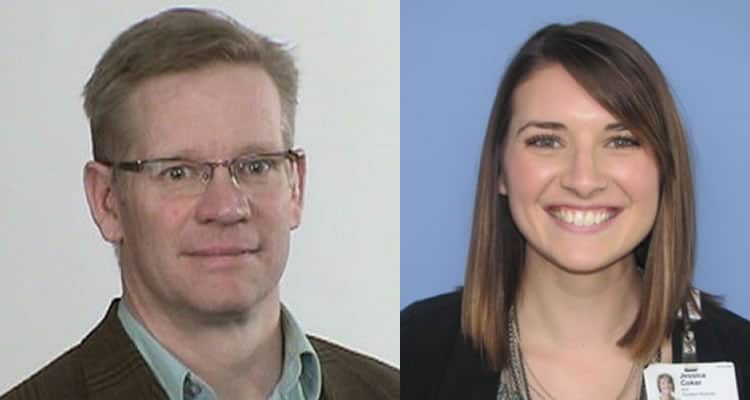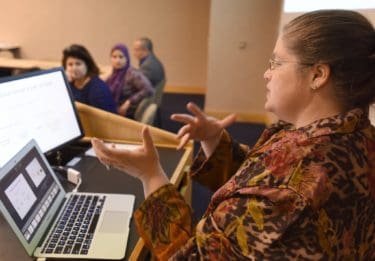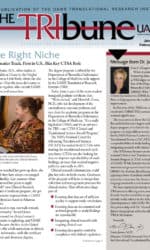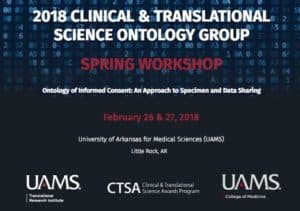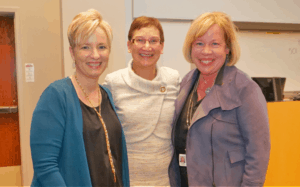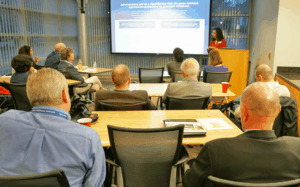Kristie Hadden, Ph.D., and her team at the Center for Health Literacy have been busy collecting national and international awards, grants and attention for their research-based tools and interventions. And for good reason – their products are becoming models for addressing a key barrier to health improvement and human subjects research.
Hadden attributes much of the center’s success to support from the UAMS Translational Research Institute (TRI), which began in 2013 with co-sponsorship of the Health Literacy Research Grand Rounds.
“The grand rounds really got the ball rolling,” Hadden said.
She invited luminaries in the health literacy field from across the country, and during their visits she consulted with them on potential research opportunities in Arkansas. Two of the researchers became Hadden’s collaborators on a $2.9 million National Institutes of Health (NIH) grant. The five-year grant is testing a diabetes education and health literacy program in patient-centered medical homes at UAMS Regional Centers across Arkansas.
“If TRI hadn’t made the lecture series possible, I don’t believe I would have been able to establish those relationships so early in my research career,” she said.
TRI Director Laura James, M.D., said it is exciting to see the Center for Health Literacy using innovative translational research approaches to tackle such a significant barrier to health improvement.
“In a relatively short time, Dr. Hadden and her team have produced strategic evidence-based interventions that will move the needle for health improvement and have an impact on human subjects research by making complex documents easier for research participants to understand,” said James, UAMS associate vice chancellor for clinical and translational research.
Low health literacy is thought to impact as many as 37 percent of Arkansans and is known to influence a number of health-related outcomes, such as adherence to treatment plans.
In just the last year, the Center for Health Literacy has:
Made UAMS home to the largest known set of patient health literacy screening data in the U.S. This feat stems from piloting a health literacy screening question in the UAMS electronic health record Epic. In October 2017, the pilot results earned Best Poster from more than 200 entries at the International Conference on Communication in Healthcare/Health Literacy Annual Research Conference. Hadden, in collaboration UAMS’ Fred Prior, Ph.D., and Ahmad Baghal, M.D., also submitted a manuscript about the screening to the Journal of the International Medical Informatics Association. Prior chairs the Department of Biomedical Informatics and Baghal is director of the Arkansas Clinical Data Repository.
“We have a lot of momentum behind this screening,” Hadden said. “It’s pretty exciting – more than 100,000 patients have been screened and we have yet to implement it across the entire clinical enterprise.”
The resulting data could be used in an array of population health studies, she said.
Established the largest known collaborative of health literacy researchers in the U.S. The Center for Health Literacy Affiliate Faculty Group includes about 30 faculty from UAMS and across the U.S. committed to collaborative health literacy research. Since it was created in 2017, the multidisciplinary group has produced more than 20 publications.
“We’re a very productive group,” Hadden said. “I don’t know of another group like it out there.”
Shared the center’s plain-language informed consent template nationally via IRB Advisors Inc. The template created by the center in 2016 dropped mean readability of UAMS informed consents to an 8th grade level. Already available to UAMS researchers, IRB Advisors, an online medium, recently asked to share the template with its national audience.
“We’re hoping it will be widely used by investigators across the U.S.,” Hadden said.
Recently applied for a NIH grant to further study the plain language informed consent template’s impact. The next step for the template is to compare it to traditional informed consent approaches in a large, multicenter clinical trial. Hadden leveraged a special grant opportunity available to Clinical and Translational Science Awards (CTSA) Program sites to develop a partnership with the CTSA at the University of Alabama at Birmingham. The informed consent study will be nested within a $19.3 million multi-site study examining the effects of pharmacotherapy for mild hypertension in pregnancy among 4,700 to 5,700 patients.
If funded, the study will determine whether the plain language template improves comprehension for participants; whether subjects are more or less likely to enroll; and if they are more or less likely to stay in a study.
Researched a Spanish-language health literacy screening tool. Validated screening questions were adapted and tested using a 2017 TRI Pilot Award. Hadden said she is close to releasing study results.
“We’ve got some great findings that will help guide practitioners on how to best identify Spanish speaking patients who need resources and interventions,” Hadden said.
Joined national health literacy policy leadership. Chris Trudeau, J.D., a Center for Health Literacy faculty member, was appointed to the Institute of Medicine/National Academy of Science Roundtable on Health Literacy, which meets quarterly in Washington, D.C. “It’s an incredible honor to be at the table with such high-level leadership,” Hadden said.
Developed a new set of patient opioid education tools. As part of a targeted intervention for orthopaedic surgery patients at UAMS, the tools are being shared across UAMS, with other health systems, and with national medical associations and societies.
They can be found at: healthliteracy.uams.edu.
Won a national award for Spanish-language tool. The center received the ClearMark Award of Distinction from the Center for Plain Language for How to Talk to Your Doctor HANDbook – Spanish. The center also received the Spanish Grand ClearMark Award, the highest honor for all 2017 Spanish nominations.


